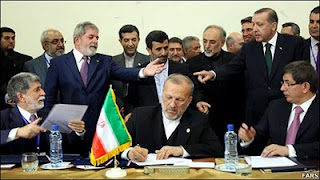Iran's uranium exchange and ambiguities

Despite that Turkey and Iran signed an agreement on exchange of 1,200 kg of low-enriched uranium in the territory of Turkey, along with new hopes for resolving problems connected with Iran's nuclear program, there are uncertainties.
During his visit to Greece, Turkish Prime Minister Recep Tayyip Erdogan said that he canceled his visit to Iran. Erdogan described the main reason the unconstructive position of Iran on nuclear fuel. But two days after this statement, he canceled his visit to Azerbaijan and immediately left for Tehran.
Brazilian President Lula da Silva, Iranian President Mahmoud Ahmadinejad and Erdogan signed an agreement on the exchange of nuclear fuel on May 17.
Of course, this step to some extent reduces the pessimism that exists between Iran and the international community, but on the other hand, the exchange of uranium may become a pretext for official Tehran to begin talks on nuclear program with the West. But the uncertainty in Iran's nuclear program still remains as before. Still the urgent problems are continuing testing of nuclear weapons, continuing uranium enrichment and the issue of Iran's participation in the Additional Protocol to the Treaty on the Non-Proliferation of Nuclear Weapons.
Official Tehran's position changed in one day. This says that the hasty decision was not discussed within the country and that there is a probability to cancel the deal as a result of protest of radical forces. Permanent members of UN Security Council discuss new sanctions against Iran, and these discussions will lead to cancelling Iran's decision.
In October 2009, at the initiative of former Secretary General of IAEA, Mohamed ElBaradei, 1,200 kg of low-enriched uranium had to be exported from Iran, and after enrichment to 20 percent abroad transformed into fuel. It had to be returned to Iran. This fuel was supposed to provide a nuclear laboratory, built by the United States in 1960.
This laboratory produces radioisotopes for medicine.
Although the West supports ElBaradei's initiative, Iran, citing "lack of confidence in the West and the probability of fraud, refused to exchange uranium. In 2009, the 3.5-percent uranium reserves of Iran totaled 1,500 kg, and sending 1,200 kg of them would mean the export of 70 percent of Tehran's uranium reserves. Having enriched 1,500 kg uranium up to 90 percent, Iran could produce nuclear weapons. The most obscure is that now enriching two kilograms of 3.5 percent uranium per day, Iran has 2,100 kg of low-enriched uranium, and even sending 1,200 kg of reserves abroad, Iran still has a certain volume of uranium needed to produce nuclear weapons.
On the other hand, Iran enriched 100 kg of 3.5-percent enriched uranium to 20 percent in early 2010 to produce fuel at the Tehran laboratory and now the country has 10 kg of 20-percent enriched uranium. Although the agreement signed between Iran, Turkey and Brazil, stipulates sending of 1,200 kg of 3.5-percent enriched uranium Turkey, the fate of 20-percent enriched uranium was not clarified and Iran has not even officially announced that it would uranium enrichment in the country.
In addition to the agreement, the joint statement by Erdogan, Silva and Ahmadinejad says that Iran is entitled to uranium enrichment, despite the fact that each of the UN Security Council's five resolutions against Tehran's has urgently demanded suspension of uranium enrichment since 2006. On the other hand, the West and especially the IAEA, strongly demand from Iran to join the Additional Protocols to the Convention on the Non-Proliferation of Nuclear Weapons (NPT), which Iran refuses.
Despite the fact that Turkey and Brazil are temporary members of the UN Security Council the motive of their mediation between the West and Iran should not escape the notice. Brazil has an annual turnover worth $1 billion with Iran and despite the fact that the trade cooperation of Turkey and Iran hits 2 billion it tries to bring that figure to $10 billion. In fact, Brazil, as one of eight economically powerful countries, thinks about the expansion of geopolitical influence and economic cooperation, but Turkey is trying to prove to the West that it is a powerful ally and tool in establishing stability in the Middle East.
In any case, Iran's consent on the uranium exchange could be an encouraging step, but only on condition that the uranium exchange will be start for the constructive discussions of this country with the West.

Comments
Post a Comment